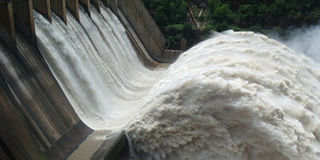Major blackout as key hydro station fails

A hydro power-station: Kenya Power said that the Gitaru hydro station which has a capacity of 225 megawatts (MW) suffered a technical hitch that affected electricity generation. PHOTO | FILE
What you need to know:
Previous blackouts have forced businesses to install standby generators that they switch on during supply cut-off, raising their operation costs.
Many parts of the country have been cut off power supply following a generation hitch at the country’s biggest hydro-electricity station.
Kenya Power said that the Gitaru hydro station which has a capacity of 225 megawatts (MW) suffered a technical hitch that affected electricity generation.
“At 11.30am, a loss of generation at Gitaru hydro station resulted into a major power outage that affected other sources of electricity,” Kenya Power said in a statement. “Efforts to restore normal supply are ongoing.”
Previous blackouts have forced businesses to install standby generators that they switch on during supply cut-off, raising their operation costs.
Gitaru accounts for 9.6 per cent of the country’s installed capacity of 2,333 MW.
Largest hydro station
The station in 2012 also plunged parts of the country into darkness after a transformer at one of the turbines at the station blew up.
It is the largest hydropower station in East Africa and located at the border of Embu and Machakos counties.
The station, which is owned and operated by power producer KenGen, is part of the Seven Forks Hydro stations on Tana River.
Others are Masinga power station (40 MW), Kamburu (94 MW), Gitaru (225 MW), Kindaruma (72 MW) and Kiambere (168 MW).
Kenya relies on a mix of geothermal energy, hydropower, wind and thermal energy.
Hydropower accounts for the second largest share (35.1 per cent) of Kenya’s total power capacity of 2,333 MW. Expensive thermal power ranks first at 35.7 per cent, while geothermal energy is third at 26.8 per cent.




